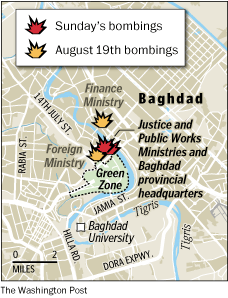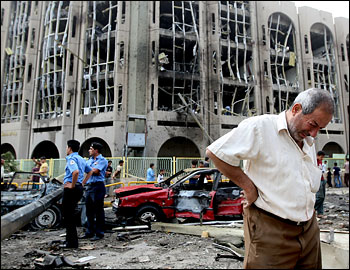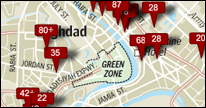Bombings rock Iraq's political landscape
DEADLIEST ATTACKS IN TWO YEARS
'A clear message' to Maliki before elections



Discussion Policy
Comments that include profanity or personal attacks or other
inappropriate comments or material will be removed from the site.
Additionally, entries that are unsigned or contain "signatures" by
someone other than the actual author will be removed. Finally, we will
take steps to block users who violate any of our posting standards,
terms of use or privacy policies or any other policies governing this
site. Please review the full rules governing commentaries and discussions. You are fully responsible for the content that you post.
|
BAGHDAD -- Twin car bombs that devastated three government buildings and killed 132 people Sunday underlined a new strategy in Iraq's contest for power ahead of January elections: spectacular blows aimed at destroying faith in Prime Minister Nouri al-Maliki's ability to secure the country as the United States withdraws, officials and residents said.
Sunday's attack, cutting through snarled traffic during the morning rush hour, was the worst in Baghdad since 2007. With an attack Aug. 19 that killed about 100 people, insurgents have now wrecked an array of pillars of the state's authority: the Foreign, Finance, Justice, and Municipalities and Public Works ministries, along with the Baghdad provincial headquarters, which are all gathered in a fortified swath of downtown.
Unlike the carnage unleashed by attacks in crowded mosques, restaurants and markets, aimed at igniting sectarian strife, these blasts appeared to rely on a distinctly political logic. In elections scheduled for January to choose a new parliament, Maliki has staked his future on having restored a semblance of security to the war-wrecked country. In the street Sunday, where blood and ashen detritus mixed with water surging from broken mains, that claim seemed as tattered as the forlorn facades of the targeted buildings.
"It is a clear message to Maliki's government that it cannot control the situation," said Wihda al-Jumaili, a Baghdad Provincial Council member opposed to Maliki's faction.
Hours after the attacks, spaced less than a minute apart, Maliki visited the scene, where cars caught in traffic jams were turned into tombs, their passengers incinerated inside. The smell of diesel mixed with the stench of burning flesh as he surveyed the destruction. As in August, he blamed former members of Saddam Hussein's Baath Party and the insurgent group al-Qaeda in Iraq, although in a sign of the uncertainty that prevails in Baghdad, others levied charges against the full spectrum of Iraq's neighbors and parties.
"The cowardly acts of terrorism which occurred today, must not weaken the resolution of Iraqis to continue their journey and to fight the followers of the fallen regime, the Baathists and al-Qaeda," Maliki said in a statement released by his office.
In Washington, President Obama condemned the attacks. He said in a statement that the United States "will stand with Iraq's people and government as a close friend and partner as Iraqis prepare for elections early next year."
The attacks came at a precarious moment in Iraqi politics. Parliament has yet to agree on legislation to organize the planned Jan. 16 vote, despite warnings by the United States and the United Nations that time will probably run out by next weekend. Critics have also complained that some of the key officials charged with security -- Maliki and Interior Minister Jawad Bolani -- are more engaged in the election than in running the country.
"Security officials are busy with politics," said Asma al-Musawi, a parliament member from a bloc allied with cleric Muqtada al-Sadr, whose followers represent one of Maliki's main challengers in the coming election. "Now everybody's accusing everybody else."
Violence has receded across much of Iraq since the height of the sectarian war. With little fear, drivers ply the roads of provinces such as Anbar, once the cradle of the insurgency. But the bombings in August, as well as Sunday's, revealed a remarkable prowess in logistics and planning. The buildings attacked Sunday -- the Justice ministry, the provincial headquarters and the Municipalities and Public Works Ministry -- were well fortified, tucked behind rings of checkpoints, although the street connecting them had been reopened this summer.
The targets themselves seemed to reflect an older chapter of the insurgency, when attacks were less frequent but often more devastating. "This was a bloody and painful attack," said Abbas al-Bayati, a Shiite lawmaker who plans to run with Maliki's bloc in January. "We need to reassess our security and redeploy our armed forces. We need technical assistance from the Americans."
After the earlier attacks, Maliki's government arrested several army and police officers, accusing them of negligence. Officials also promptly claimed to have detained the culprits, and they aired a video of a man who confessed to organizing the attacks. But U.S. officials later cast doubt on the veracity of the arrests and the confession.



 Why Do I Have to Log In Again?
Why Do I Have to Log In Again? Discussion Policy
Discussion Policy


